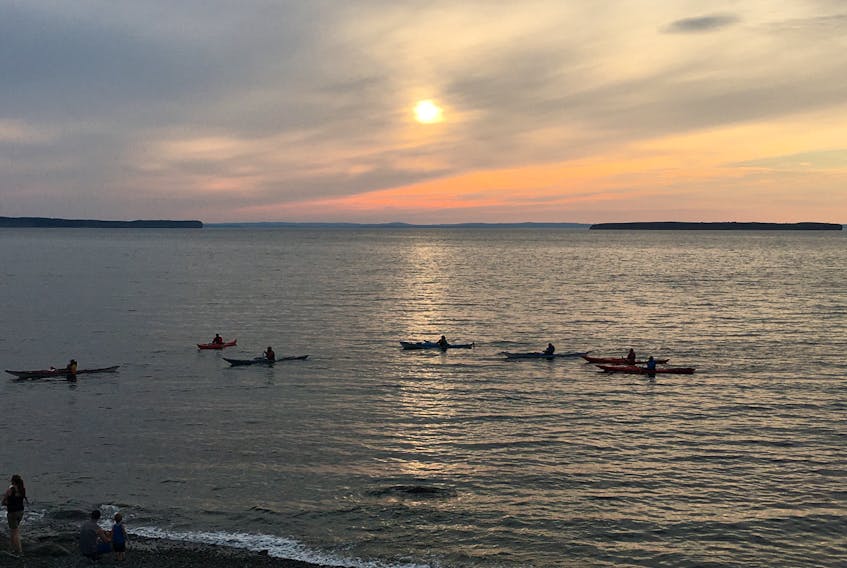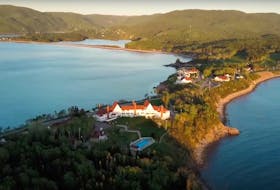Canadians will be asked their opinions as the federal government begins crafting its strategy to develop a blue economy.
Fisheries and Oceans Minister Bernadette Jordan says the online consultation process will begin in the new year to open up the discussion to provinces, territories, Indigenous peoples and others. More details on the process will come soon, she said.
That was just one of the details revealed Thursday, Dec. 3, in a virtual panel discussion hosted by the Ocean Frontier Institute (OFI), following up on the announcement of the previous day of Canada’s commitment with 13 other nations to sustainably manage 100 per cent of its oceans.
The OFI-hosted virtual panel discussion — Charting a Course for a Sustainable Blue Economy — focused on Canada’s opportunities for sustainable growth of the “blue” economy.
Panelists included OFI’s CEO and science director Dr. Anya Waite, OFI’s strategic engagement officer Catherine Blewett and Karin Kemper, global director for environment, natural resources and blue economy global practice with the World Bank, as well as Jordan.
244,000 kms worth of management
WHAT'S A BLUE ECONOMY?
The blue economy is described as an economy driven by sustainable, ocean resources and accounts for about $31.65 billion annually in GDP. It is the source of almost 300,000 Canadian jobs with direct, indirect and induced benefits in sectors as diverse as fisheries and aquaculture, marine transportation, ocean energy and technology, recreation and tourism.
WHAT IS PROBLUE?
This is a multi-donor trust fund that “supports the sustainable and integrated development of marine and coastal resources in healthy oceans.” PROBLUE has four pillars: fisheries and aquaculture, marine pollution, oceanic sectors, and seascape management. To date, PROBLUE has received pledges of approximately US$110 million from Canada, Norway, Sweden, Denmark, Iceland, France and Germany.
There are many challenges ahead for those who aim to grow the blue economy. One is just the sheer expanse of the seas on planet earth.
Waite noted if the world’s ocean were measured as a country, it would be the seventh largest in the world.
And among the world’s nations, Canada governs a massive marine environment — three oceans and a coastline of about 244,000 kilometres.
Those marine areas are crucial, not just to national economies, but to the global environment.
The Labrador Sea, for instance, on Canada’s East Coast, is referred to as “the Earth’s lungs.”
The seawater in that space absorbs carbon and heat; it’s a natural filter that helps regulate global climate.
“The Labrador Sea is a bigger carbon sink than the Amazon rain forest,” said Waite. “The ocean is our climate.”
Protecting the ocean environment will be a significant task.
The ocean economy

Finding balance between environmental protection and economic needs will be another.
Globally, said World Bank director Kemper, one in 10 livelihoods are dependent on fisheries, with women making up about half of the fish harvesting/processing workforce.
She said as Canada and the other nations move towards sustainable management, there may be some short-term tradeoffs, but “in the long term we have to focus on sustainability.”
And as countries begin the process of recovering from COVID, she said, some short-term solutions could aid the long-term goal of the sustainable oceans commitment.
“Governments might want to do large infrastructure projects to create employment – putting money into people’s pockets in the short term,” she said, “and that could lead to things like cement seawalls to prevent coastal erosion, planting mangroves to rebuild swamps or doing recovery work on reefs.”
There’s no dispute that there’s still much to learn about the ocean.
According to Jordan, the current Canadian government has done much work since 2015 to improve research and rebuild fish stocks.
For example, she said, funding was recently increased to expand knowledge of caplin, the fish that feeds other fish, in the Newfoundland and Labrador region.
“We are using the new funding to examine this data to determine how it can be used to establish reference points to advise resource managers,” she told SaltWire.
Since 2018 she noted, the federal government has completed rebuilding plans for six of 19 selected fish stocks.
More than fishing

The blue economy is not only the fishing industry.
“Our ocean industries account for nearly $32 billion annually in GDP and 300,000 jobs across fishing, aquaculture, energy, ocean technology, shipping, tourism and other industries.”
And the goal of ocean sustainability is a global one, with a challenge for progressive nations to help underdeveloped countries in sustainable ocean management.
That’s why Canada is also committing to help other nations craft their own sustainable oceans plans through the World Bank’s PROBLUE fund.
Thursday Jordan announced Canada will invest another $4 million to that fund, for a total commitment of $69 million, making this country the top donor to the fund so far.
You can watch the full panel discussion here:
Transforming the ocean economy; the principles
The following principles are outlined in the report “Transformation for a Sustainable Ocean Economy”, a vision document created by Canada and the 13 other nations that have committed to enacting sustainable management of 100 percent their oceans by 2025.
• Alignment: Ocean protection and production must align with the UN Framework Convention on Climate Change and the Paris Agreement, the Convention on Biological Diversity, and the Polluter Pays Principle as set out in the Rio Declaration. Actions must be aligned across ocean-based and land-based activities and ecosystems.
• Inclusiveness: Human rights, gender equality, community and Indigenous Peoples’ participation, through their free, prior and informed consent, must be respected and protected.
• Knowledge: Ocean management must be informed by the best available science and knowledge, including indigenous and local knowledge, and aided by innovation and technology.
• Legality: The UN Convention on the Law of the Sea is the legal basis for all ocean activities, and existing international ocean commitments must be implemented as a foundation for achieving a sustainable ocean economy.
• Precaution: Where there are threats of serious or irreversible damage, lack of full scientific certainty shall not be used as a reason for postponing cost-effective measures to prevent environmental degradation.
• Protection: A healthy ocean underpins a sustainable ocean economy. A net gain approach must be applied to ocean uses in order to help sustain or restore the health of the ocean.
• Resilience: The resilience of the ocean and ocean economy must be enhanced.
• Solidarity: The need for access to finance, technology and capacity building for developing countries, especially Small Island Developing States and Least Developed Countries, must be recognised, taking into account their particular circumstances and vulnerabilities.
• Sustainability: The production and harvesting of ocean resources must be sustainable and support resilient ecosystems and future productivity.
Click here for more about the Ocean Frontier Institute visit.









